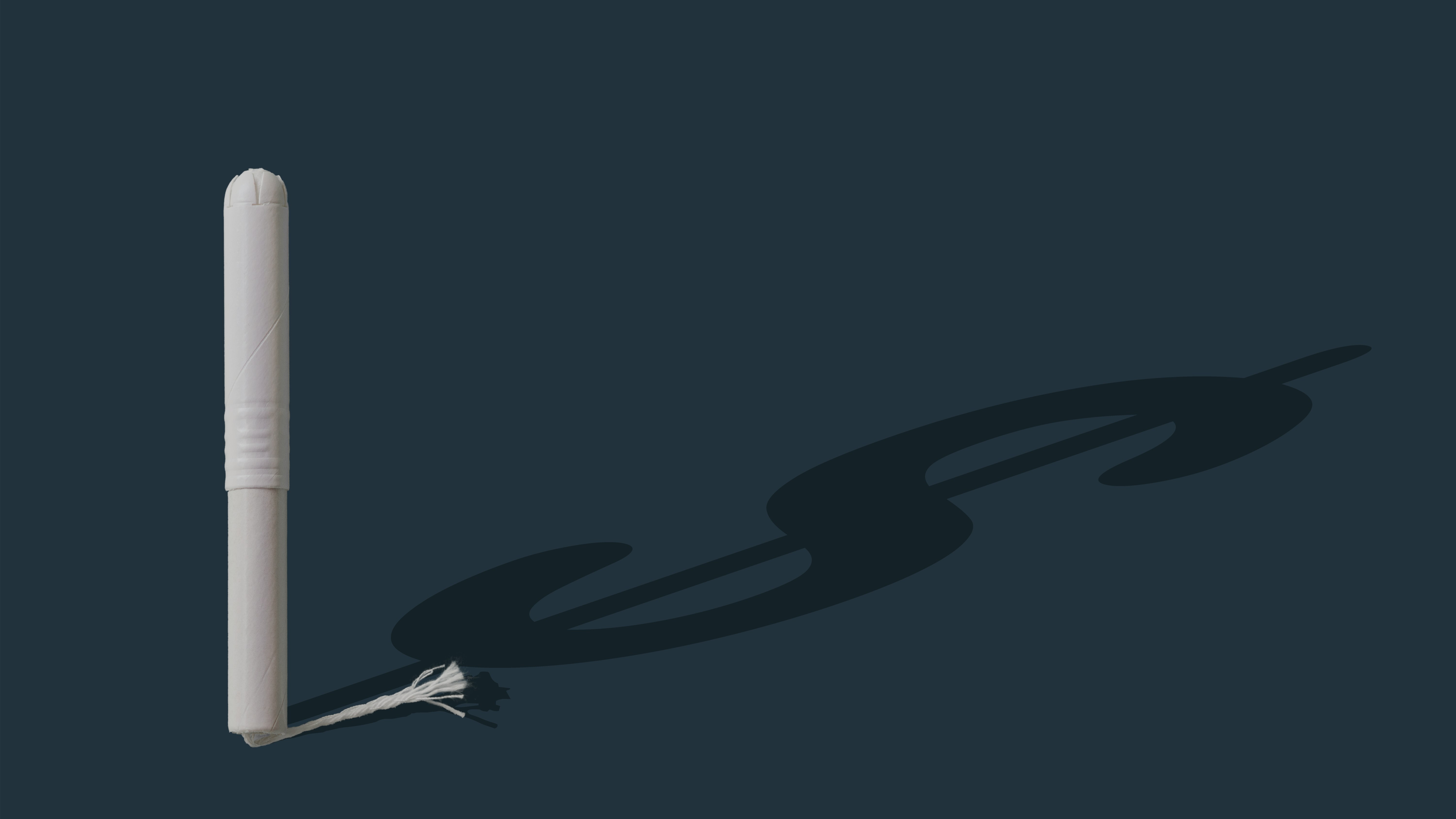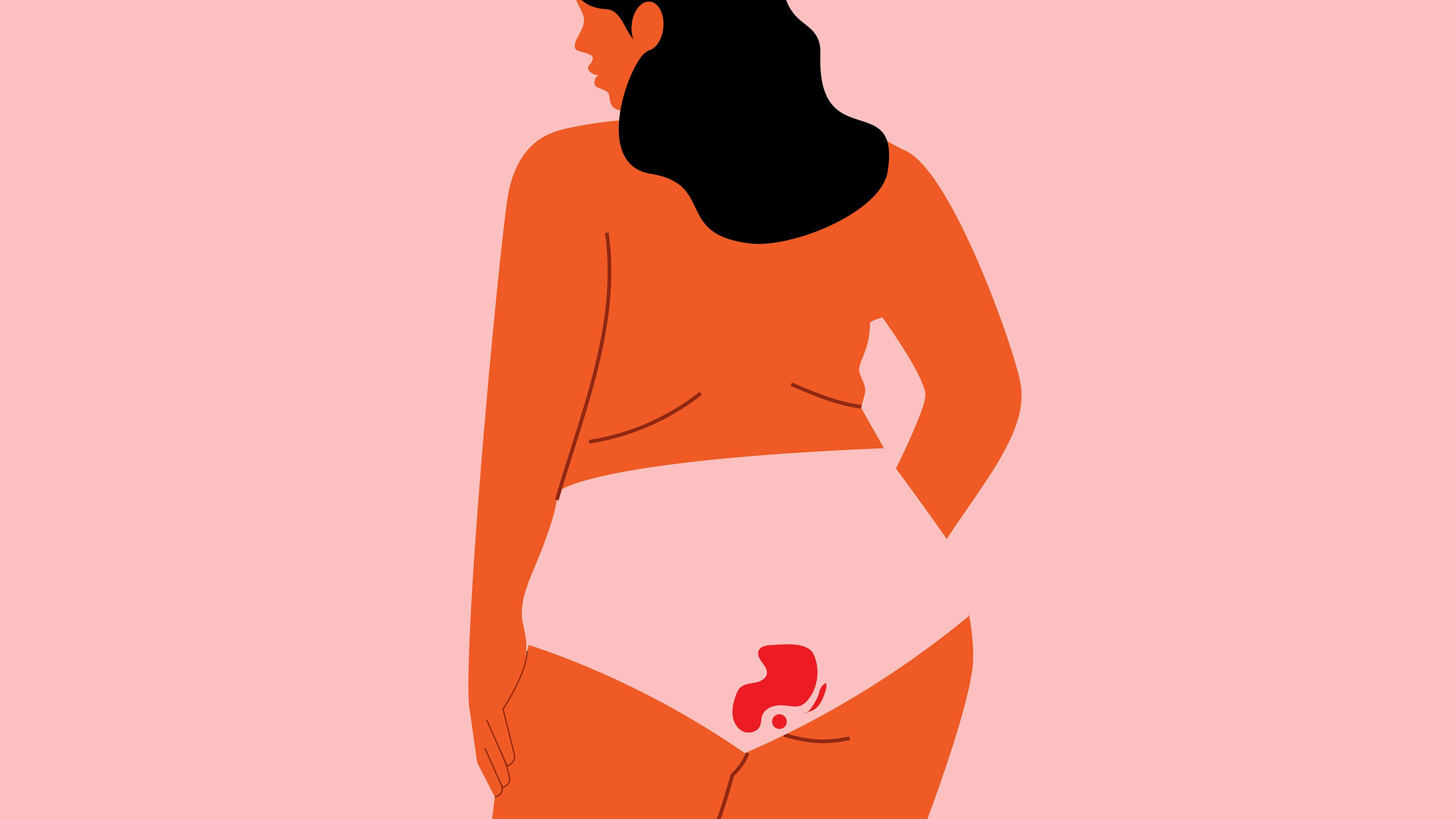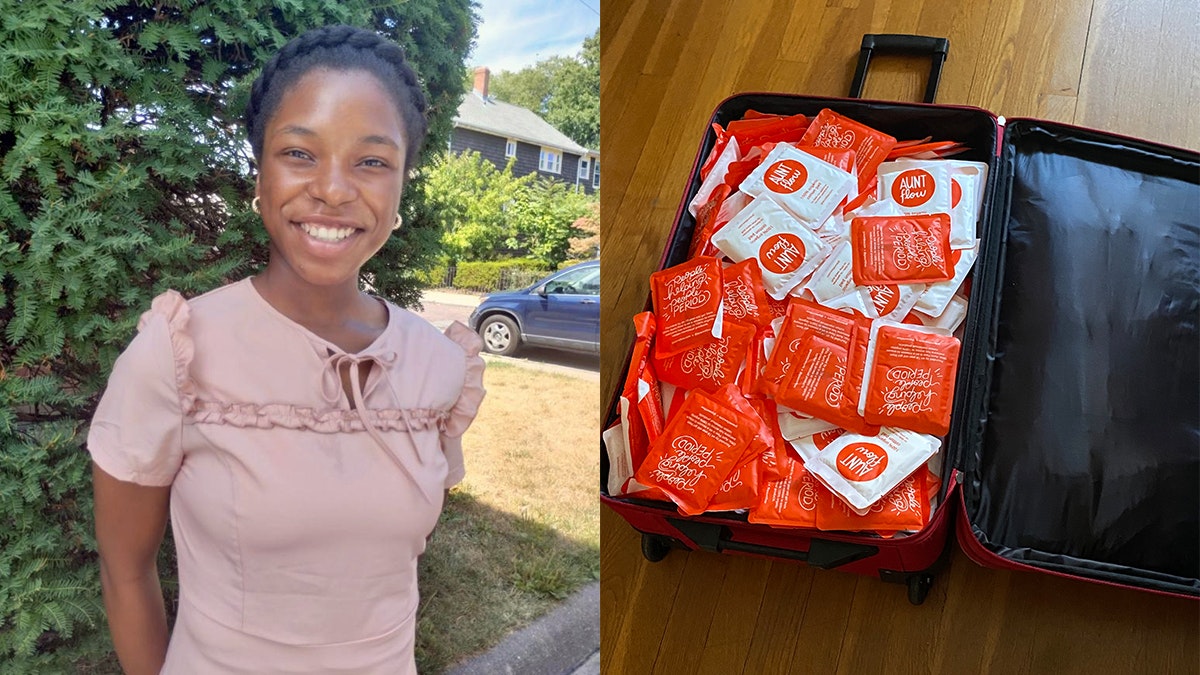Striving for a Full Stop to Period Poverty

Many in the United States can’t afford menstrual hygiene products. Students are helping to bring attention to and alleviate the problem.
That Time of the Month. The Curse. Aunt Flo. The Crimson Wave. Code Red. Shark Week.
Roughly half the world’s population is born with a uterus, yet the sheer number of euphemisms for menstruation makes it clear that the topic remains taboo.
A recent Schlesinger Library exhibition, Out for Blood: Feminine Hygiene to Menstrual Equity, put the shame that has historically existed around the menstrual cycle on full display.
“Going through the collection, staff members were all pretty horrified by the 20th-century advertising pamphlets and magazine ads for menstrual and feminine hygiene products that relentlessly emphasized secrecy and fear of odors and the need to sanitize women’s vaginas,” says Lee Sullivan, the Library’s head of printed and published materials and curator of the exhibition. “A lot of products were produced to keep periods hidden and smells eradicated (to be attractive to men) with no product safety testing—which of course resulted in some serious health implications in the 1980s with toxic shock syndrome.”

Hexol, now sold as a household cleaner, was once marketed as helping with feminine odors. This example from the 1950s, which is in the Schlesinger Library’s memorabilia collection, appeared in the exhibition.
This stigmatization has had dire consequences beyond the medical. The obscuring of another injustice, period poverty, refers to a lack of access to menstrual products. There’s also the larger issue of menstrual equity, which includes the lack of education about reproductive health, of hygienic washing facilities, and of reliable waste management. What’s more, 22 US states levy a tax on menstrual products.
“The idea that menstrual products are a necessity and should be affordable, untaxed, and without toxins—and preferably free, as toilet paper is in public places—has only been a very recent phenomenon,” Sullivan says.
With the reproductive window averaging 38 years, pads and tampons alone add up to nearly $7,000 over a lifetime, but estimates that take a more inclusive view of period products put the price of a monthly cycle at over $18,000 over a lifetime.
It’s no surprise then that a 2021 industry survey found that two of five respondents struggled to afford period products, with lower-income people, many of whom are of color, being the hardest hit. The same study found an increase in people who used substitute materials, such as toilet paper or socks, when they couldn’t afford pads or tampons. Even so, 38 percent of respondents missed out on daily activities—including work and school—due to lack of access to these basic products.
In relatively privileged communities—even at Harvard—period poverty is regularly experienced by individuals. Fortunately, feeling less bound by the taboos of yesteryear, local students are organizing to bring menstruation to the forefront—and to make both information and products available to anyone who needs or wants them.

One in five respondents to a 2021 survey struggled to afford period products—and many of those used substitutes such as toilet paper or socks. Illustration by Monika Jurczyk/Adobe Stock
Taking Shame Out of the Conversation
Amanda Lubniewski lives and works with Harvard students. In addition to serving as Radcliffe’s student engagement specialist, she’s a proctor in Matthews Hall, the first-year dorm tucked into the southwest corner of Harvard Yard. There, she oversees around 30 students, helping create community, advising them academically, and occasionally breaking up their parties. (“I feel like the mother hen,” she says with a laugh.)
Embedded in student life as she is, Lubniewski hears it all: “There’s banter among students about which bathrooms on campus have sanitary products available, or about the constant struggle of why they’re available in some and not all.”
So when the Out for Blood exhibition opened in the Schlesinger’s Lia and William Poorvu Gallery, Lubniewski saw an opportunity. She reached out to the Harvard College Women’s Center about student groups on campus that might like to partner for a student-centered event. They led her to the Harvard chapter of the Massachusetts Menstrual Equity Coalition (MME), a group whose mission it is to end period poverty statewide.
With student input, she organized a community event at the Schlesinger. And on September 28, 30 attendees from across Harvard and the surrounding community gathered for an exhibition tour led by Sullivan and a panel discussion with Harvard MME leaders—Chioma Ugochukwu ’23 and Jessie Liu ’24, who are copresidents, and Shruti Gautam ’25, vice president—and Sasha Goodfriend, the executive director of Mass NOW. They discussed menstrual equity and efforts to promote it, whether through education and distribution at Harvard, the I AM bill at the state level, or the Menstrual Equity for All Act at the federal level.

Panelists at a Radcliffe community event (L to R, Lubniewski, Gautam, Ugochukwu, Liu, and Goodfriend) discussed menstrual equity and efforts to promote it at Harvard and across the nation. Photo courtesy of Amanda Lubniewski
Although these efforts seldom face outright opposition, direct support for menstrual equity can only be built by talking openly about periods—a personal topic that doesn’t come naturally to many.
“In my culture, women don’t talk about their bodies, and there’s menstrual shame,” says the Detroit-born Ugochukwu, whose family is Nigerian. This silence never sat well with her, and she rebelled by talking about menstrual issues and taking part in feminist activities. For that reason, she felt deeply connected to the exhibition contents. “That sense of connection really stuck with me and reminds me that our work is about us coming together, building on that connection, and leveraging it in order to get where we need to go,” she says.
Gautam has been talking about periods since her freshman year at Rock Bridge High School in Columbia, Missouri, when to receive honors distinction in her civics class, she undertook a project to provide period products in school bathrooms. Although she has two sisters and her parents are doctors, menstruation wasn’t talked about in her home.
“I did get resistance, but I think a lot of it just came from people feeling embarrassed to talk about it,” she says.
The more Gautam talked about menstruation—even lobbying her state representative—and pursued her distribution projects, the more comfortable everyone became, both at home and at school: “I went bathroom to bathroom with a trolley of pads and tampons with my friends, who didn’t act as if it was something abnormal,” she says. “When I came here on campus. I really wanted to find a space to continue that work.” Through Harvard MME and policy work, she’s doing just that.

Today's student activists hope to take the shame out of the natural process of menstruation. Illustration from Aleks Che/Adobe Stock
Securing Free and Accessible Products
But it’s not only College students tackling the issue. Radcliffe’s Emerging Leaders Program (ELP) brings together Harvard undergraduate mentors with local high school sophomores for weekly learning sessions over the course of the spring semester.
“Throughout that program, we look at leadership, social movements past and present, and what we can learn about leadership and social change that the young people can take and inform their own practice in wanting to get involved in their own communities,” says Kaiti Jones, ELP manager. The high school mentees then study agents of change in the Schlesinger archives—such as Angela Y. Davis, Pauli Murray, and NARAL—and design social projects to be carried out in their communities. Last year, five of the mentees chose to focus on menstrual equity.
“Even though the Out for Blood exhibition was happening, I don't think that was the impetus for the projects,” says Martha Schnee, the ELP facilitator. “A lot of the students framed it as this moment of passion about menstrual equity and feminine hygiene—so we got to send them over there, which was a really cool connection so that we could keep that link between archive and action.”
Tamar E., a student at Prospect Hill Academy Charter School, in Cambridge’s Central Square, became involved with ELP last year when a teacher nominated the then-sophomore for the program. “A lot of people, teachers and parents and classmates, will tell me that they see leadership qualities in me, but no one ever really took the time and the money to guide me through the process of being a leader, especially for something as big as a social justice project,” she says. “I thought it was really cool that ELP would be doing that.”
Hers was one of the five projects to address menstrual equity. “I just remember hearing about how there are so many girls in our home state, Massachusetts, who don't have access to pads and tampons in the same way someone as fortunate as me does,” says Tamar. “Pads and tampons are literally a necessity for us to remain clean and have dignity—so that really boils my blood.”
With the help of her mentor, Tamar designed a project that would place menstrual hygiene stations in communities across the state. Although her time with ELP has come to a close, Tamar continues to work on the project, sending out e-mails and making cold calls to find places to host the hygiene stations, a process which she’s found daunting. “It has been really difficult because some places aren’t as willing to have stations as others,” she says. In October, however, Tamar had a big win: Love Your Menses, a menstrual equity organization with which she partnered for product donations, unexpectedly sent a large box of pads and tampons for her planned stations.
“There’s so many pads in there, and they’re really good-quality pads, and I was just so happy and overwhelmed,” says Tamar. “I started this project back in January, and a lot of time had passed, with a lot of struggles and ups and downs. So seeing that really motivated me—like, really sparked my imagination and my vision. Now I have this resource, and I have to give it to the world and just help my community with it.” She plans to continue her work and looks forward to the day when her menstrual hygiene stations are up and running—a goal she knows will take a village to achieve.

The Prospect Hill Academy student Tamar E. (left) hopes to address period poverty by setting up feminine hygiene stations in municipalities across the state. At right, the products sent to her by Love Your Menses for that purpose, which she moved into a suitcase for storage purposes. Photos courtesy of Tamar E.
Uguchukwu agrees. “It takes multiple groups on campus to get something that we consider a natural right, just having this product everywhere,” she says. “I had to understand how much effort it takes sometimes to get things that we sometimes consider simple.”
She and Gautam are proud of the work they’ve done so far, especially securing a budget line item with the administration to provide menstrual products in bathrooms across Harvard Yard, even after they’ve graduated. And both are taking what they’ve learned into other areas.
Last month, Ugochukwu was surprised to receive a last-minute invitation to apply for a White House reproductive rights summit, convened by Vice President Kamala Harris, with 75 college student leaders from across the country. There, she met other local college students sharing this work, making connections and building coalitions. Gautam is also broadening her activism in other areas of reproductive justice, and she will soon start training at the Boston Area Rape Crisis Center.
But for all these student activists, an ideal future is one in which free menstrual products are available to anyone who needs them, whether at school, on the street, or in prisons. These are not luxury items but necessities that allow menstruators to live with dignity.
“In the ELP, we learned a lot about heroes from diverse ethnicities and ages—we even read their letters and stuff, that they made speeches which really humanize them, and they helped us remember that, at the end of the day, these heroes are just everyday people like you and me,” says Tamar. “We’re fighting against menstrual inequity, and this is a really big issue, so we can all tackle this because we all have the potential to.”
By bringing periods to the forefront, these young leaders hope to bring reproductive health education to ever broader audiences and eventually make menstrual inequity a thing of the past.
Ivelisse Estrada is the editor of Radcliffe Magazine and a senior writer at Harvard Radcliffe Institute.







